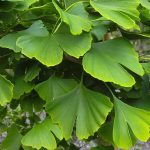 An herbal medication sometimes used to treat mild dementia or memory impairment. The active ingredient is the dry extract from the leaf of the ginkgo biloba tree. The extract is made up of several active compounds, including flavonoids, bioflavonoids, and terpenoids.
An herbal medication sometimes used to treat mild dementia or memory impairment. The active ingredient is the dry extract from the leaf of the ginkgo biloba tree. The extract is made up of several active compounds, including flavonoids, bioflavonoids, and terpenoids.
Extracts of ginkgo biloba have antioxidant properties similar to those of many other compounds including green tea. Studies of potential ergogenic effects do not appear to be available. In limited research, however, ginkgo has been demonstrated to decrease lipid peroxidation in vitro. Currently, ginkgo biloba show no recognized alterations in metabolism that could be implicated in enhanced exercise performance.
Extracts from the leaves of the ginkgo tree used as an herbal medicine. Ginkgo biloba is used to treat many conditions. Its chief attributes include the claim—as yet clinically unproven—that it stabilizes tissue membranes, particularly in the brain, and enhances the use of oxygen and glucose. Its primary clinical use has been in the treatment of vascular problems, such as insufficient artery function in the brain caused by atherosclerosis (hardening of the arteries). By increasing cerebral blood flow, ginkgo biloba may reduce symptoms associated with aging, including short¬ term memory loss and depression.
An herbal remedy extracted from a deciduous tree of the genus Ginkgo, native to China, which has fan-shaped leaves and spherical cones. Ginkgo biloba is promoted as a treatment for memory loss and dementia, for tinnitus, and for several other conditions. Occasional side effects of its use include bleeding and augmentation of the anticoagulant effect of warfarin.
